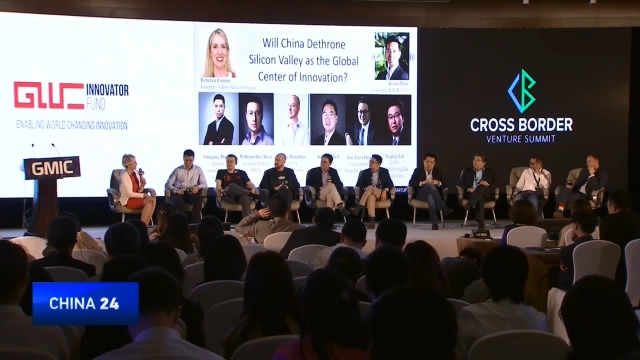
20:58, 29-Apr-2018
China's Venture Capital Industry: What's the outlook for China's tech field?
03:27

As part of China's ongoing drive to be more innovative and competitive, it recently pledged to ramp up investments in the venture capital space. China venture capital market is now the second largest in the world. What lies ahead for this industry? CGTN's Wei Lynn Tang spoke to some VC players at the GMIC Cross-Border Venture Summit.
WEI LYNN TANG BEIJING "2017 saw a record high in investment deals backed by venture capital, hitting 182 billion US dollars globally. Of this, Greater China accounted for one-third of total deal value."
In fact, China is home to three of five of the world's highest-valued start-ups. They are ride-sharing company Didi, food review and delivery firm Meituan-Dianping, as well as smartphone manufacturer Xiaomi.
Kuantai Yeh from Qiming Venture Partners expects this momentum -- of deals backed by venture capital -- to continue in the future.
KUANTAI YEH PARTNER, QIMING VENTURE PARTNERS "I am putting a lot of emphasis into AI and Big Data, I think that's the fundamental technology that's driving the productivity of every space so I am putting money in AI into the medical space, I am also putting money in autonomous driving, and growth in the AI for software space that fills all the other industries."
While Kuantai agrees that valuations do seem bubbly, he is of the view that as long as you're in the right business with the right technology, there is space for valuations to go higher.
But why and how has AI and machine learning emerged as the top investing agenda for VCs?
WILLIAM BAO BEAN MANAGING DIRECTOR, CHINACCELERATOR "The reason why is because China is the most competitive market in the world. It's much more competitive to grow a company here in China than in the US because there is almost unlimited money here, money is a weapon. So if you're bringing machine learning you can do personalization, when you provide a personalized product people like you more. If you're not using AI to give that better experience you can't survive here."
But having too much money in the market may not be a good thing, William says, that's because it isn't just the good companies getting funded. The subpar ones do as well. And this results in talent shortage.
Jason Zhao at KPCB China is more upbeat though. His view is that with more capital in the market is a victory for the entire technology ecosystem and consumers, as they now have more choices. That said, there are risks.
JASON ZHAO PARTNER, KPCB CHINA "We're getting to a high point in terms of Chinese capital market, Chinese start-ups, how do we sustain the momentum for the next 5 to 10 years. Because as China grows and the rest of the world learns, competition will become more fierce; and I'd like to see Chinese companies take a bigger role as a leader not just one of the players in the global marketplace."
As it is, experts say China's e-commerce and mobile payments industries are giving the United States a run for its money. But how far ahead--or--behind still, is China from achieving its technology and innovation ambitions? The competition with Silicon Valley continues. Wei Lynn Tang, CGTN, Beijing.

SITEMAP
Copyright © 2018 CGTN. Beijing ICP prepared NO.16065310-3
Copyright © 2018 CGTN. Beijing ICP prepared NO.16065310-3